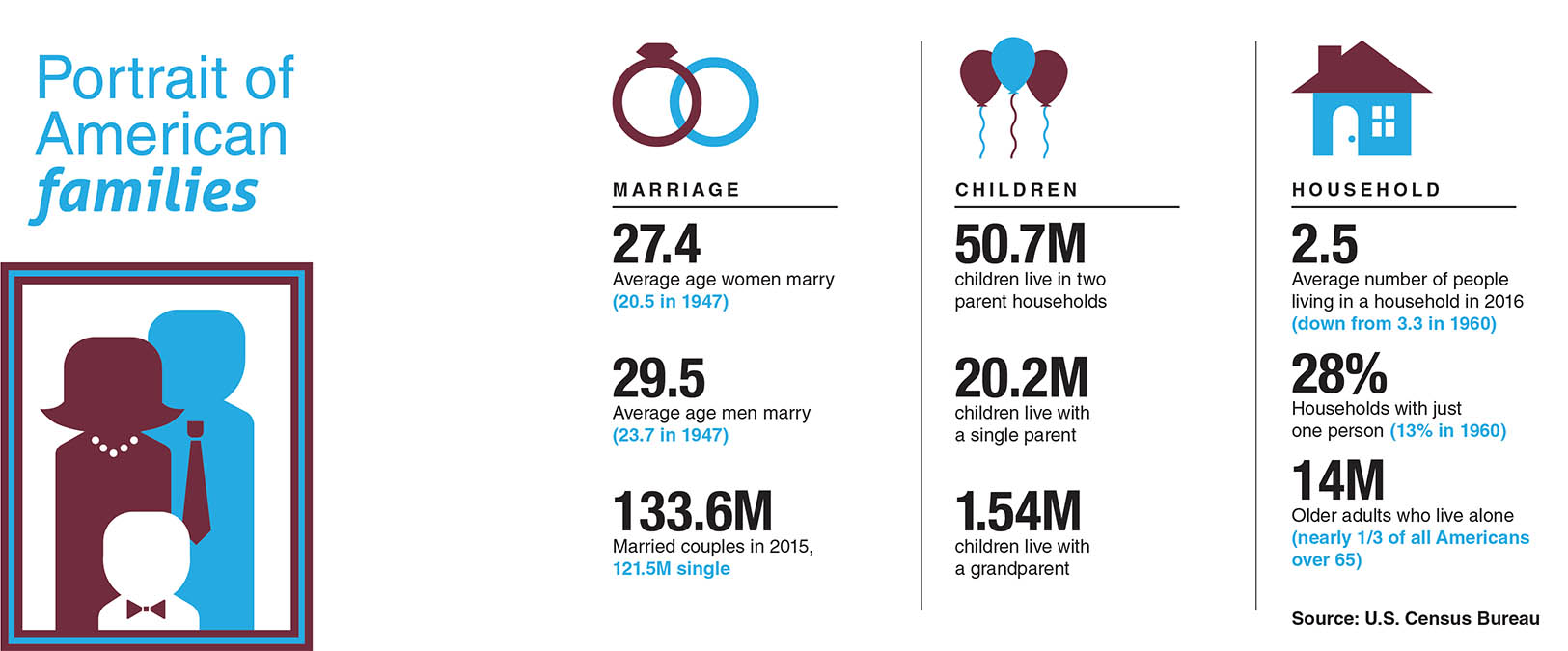The information presented on this page may be dated. It may refer to situations which have changed or people who are no longer affiliated with the university. It is archived as part of Mississippi State University's history.
Family has long been considered the basic unit of society. Greek philosophers often looked to the family as a model for the organization of the state, thus an essential pillar in the formation of our society. Since the beginning of civilization, the ties that bind our hearts and minds are wrapped in the wonderfully intrinsic and often complicated relationships bundled into a family.
Although families have existed forever, their structures have changed, particularly in the past half-century. Today's families are diverse, with a mixture of structures, from the traditional nuclear family-a father, mother and children-to single parent households, cohabitating adults, same-sex couples, and multi-generational families.
This changing family dynamic creates numerous opportunities for research by scientists Drs. Joe Wilmoth and Tommy Phillips. The duo, both researchers in the Mississippi Agricultural and Forestry Experiment Station's School of Human Sciences, have collectively been studying families for 31 years. They also study the individuals that make up a family: children, youth, and adults. Research by these scientists indicates that, though familial makeup has changed over the years, their fundamental responsibilities and the manner in which they carry out those tasks have not.
"Every family has the same basic tasks: establishing identity, managing the emotional climate, establishing and maintaining boundaries, and day-to-day management of the household," Wilmoth said.
Wilmoth explained how these concepts operate within the context of family.
Identity is how we see ourselves: the values, ethics, preferences, and habits that guide our individual and family decisions. Managing the emotional climate refers to the way family members relate to one another, manage conflict, and promote the emotional and psychological wellbeing of family members. Boundaries reflect the limits on how openly we interact with one another, both inside and outside the family. Finally, managing the household includes the routine things we do, like cooking, cleaning, and paying bills.
As family structures have changed, MAFES scientists set out to determine how each of these different family types carries out the basic functions. Scientists looked at family routines as observable and repetitious behaviors that provide structure and order to families.
"Family routines enhance child well-being and health by contributing stability and predictability to family life," Phillips said. "These routines also promote social, emotional, and mental well-being and define the roles and responsibilities of individual members."
To measure family routines, scientists constructed a survey to measure seven items and assess how frequently the sampled families observed several types of family routines. Common examples of routines included dinnertime customs, bath time rituals, bedtime practices, customary greetings and partings, and weekend leisure activities.
The study found a fairly high level of observance of family routines across all family structures. Although the nuclear family performed these tasks more frequently, the difference was not statistically significant. Overall, participants, regardless of family structure, did not differ in observance of family routines.
So, if all families function similarly, what makes for a happy, healthy family?
Going to the chapel
According to research by Wilmoth and Phillips, faith is one factor that influences the well-being of adults, contributing to happy families.
"Traditionally, the role played by religion in human well-being has been taboo in academic and research circles," Phillips said. "During my doctoral education, religion and its effect on well-being was treated as a non-factor. It was simply disregarded."
However, research suggests that religion is related to physical, mental, and relationship health, academic achievement, as well as other aspects of well-being. Religion is an important part of many people's lives, so it shouldn't be ignored when analyzing what makes for happy families, Phillips added.
For Wilmoth, a former pastor, research addressing the role of faith on the well-being of adults and marriages is a natural fit. Together, both scientists have looked at the role of faith in emerging adults and older adults. They have also looked at the role of premarital counseling and faith in marriages. A recent study examined the role of faith in 71 African American married couples.
"In one of my classes, I asked students to interview couples that had been married for a long time to determine how their marriage endured," Phillips said. "I was surprised by the number of African American couples that were interviewed given the research on marriages within this community."
Data indicate that African Americans have lower marriage rates and higher rates of divorce as compared to other ethnic groups.
"For these reasons, we decided to specifically study African Americans to determine the factors that strengthen marriage, challenges that posed threats to marriage, and key areas of disagreement within the marriage," Phillips said.
The scientists surveyed couples who had been married from 15 to 60 years, with the average of 32 years. Each survey contained a questionnaire for the husband, one for the wife, and one to be completed jointly.
When couples were asked to provide the top reasons their marriages had lasted so long, 51 percent of respondents indicated faith, followed by love, good communication, and trust and honesty as key factors in the longevity of their marriages.
As for their biggest challenges or obstacles, 49 percent of respondents listed issues with trust/infidelity and communication problems. Other issues included children, finances, in-laws, and illness or death of a child.
The final question asked, "Looking back over the years that you've been married, what would the two of you say is the one thing you've disagreed about the most?" The number one response was money, followed by decision making/communication, children, and housework, among other responses.
Phillips points out that a key factor to happiness in a marriage was the amount of time each person invested into the relationship.
"The couples that indicated they were happy in their marriage also said that they spend ‘quite a bit' or ‘all' of their time together," Phillips said. "So, the vast majority of couples, in a self-described happy marriage, made the effort to spend time together."
Additionally, in the joint and individual surveys, most participants felt that their faith was a very important factor in the longevity of their marriages, Phillips added.
The scientists point out the study's limitations. The married couples surveyed were selected from churches and recommended by their pastor. The scientists hope to replicate the research among married couples who do not attend church to understand other factors that contribute to a happy marriage.
While marriage is associated with numerous psychosocial and economic benefits for men, women, and children alike, it can also be challenging.
"While a good marriage contributes to happiness, research generally has shown that the largest gap in the well-being of American adults is between those who are in high quality marriages and everyone else," Phillips said.
Understanding the factors that contribute to a happy marriage is important for educators, counselors, pastors, and others who guide couples both before and after the ceremony.
"Individuals and families often rely on religion and faith to help them face some of the challenges that commonly arise in life," Wilmoth said. "While we can't discount the importance of faith in marriage and in families, we also don't want to dismiss other important factors, like good communication and quality time spent together."
Understanding all of the factors that contribute to happy marriages is a topic the scientists continually pursue, particularly in light of the changing family structure.
Evolving families
Wilmoth is also examining yet a different type of family structure, but one that has been increasing over the years: grandparents raising their grandchildren and multi-generational families living in one household.
In the last 30 years, there has been a significant increase in grandparents raising their grandchildren. According to census data, there are approximately 2.4 million grandparents raising 4.5 million children in the U.S.
Wilmoth has been tackling issues related to aging and the stresses grandparents often face when raising their grandchildren.
"Aging presents numerous challenges in and of itself," Wilmoth said. "Understanding the stresses and needs of grandparents raising grandchildren will assist social agencies in developing services for these families. It is an important topic that has not been researched extensively."
Likewise, Phillips has recently begun a new project to explore farm families and youth. The idea occurred to him while at a fall farming event. As he sat at a picnic table with his wife watching the owner of the farm go about his work, he considered how life on a farm is strikingly different than life in non-farm settings and how that difference might impact youth development and well-being.
"Life on the farm is hard work," Phillip said. "As an outsider looking in, one could hypothesize that living on a farm might lead to beneficial youth outcomes. However, a relatively limited amount of research has focused specifically on the characteristics of farm life and farm families and how those traits might affect psychosocial development, well-being, and outcomes in youth.
Through this multi-year study, Phillips plans to assess the characteristics of farm families in Mississippi to determine its effects on youth living and working on the farm.
Bringing it all home
As MAFES scientists continue their studies of the dynamics of families and its individual members, from the cradle to the grave, they impart their knowledge to others who can provide the services needed to promote happiness.
As Southern author Harper Lee once penned, "You can choose your friends but you sure can't choose your family, and they're still kin to you no matter whether you acknowledge them or not."
Enjoy your family and spend time together; science shows it improves your well-being.


